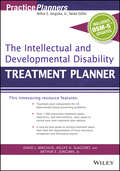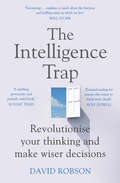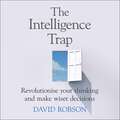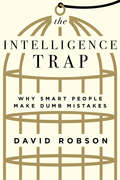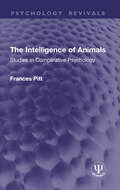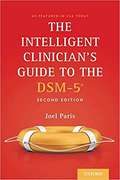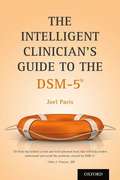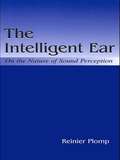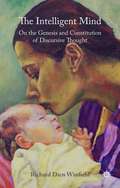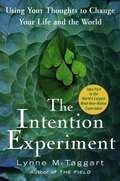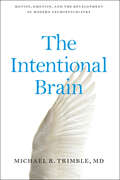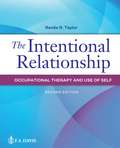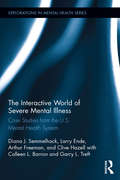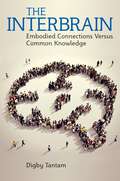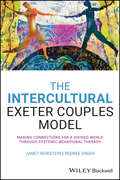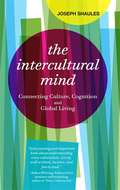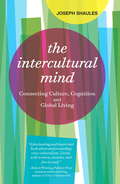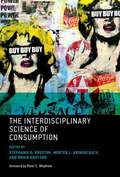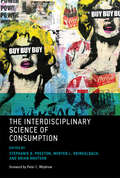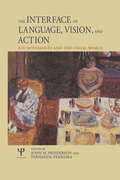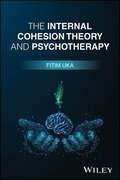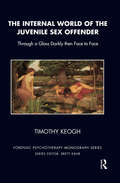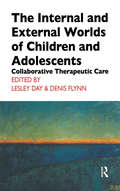- Table View
- List View
The Intellectual and Developmental Disability Treatment Planner, with DSM 5 Updates (PracticePlanners)
by Arthur E. Jongsma Jr. David J. Berghuis Kellye H. SlaggertThis timesaving resource features: Treatment plan components for 28 behaviorally based presenting problems Over 1,000 prewritten treatment goals, objectives, and interventions—plus space to record your own treatment plan options A step-by-step guide to writing treatment plans that meet the requirements of most insurance companies and third-party payors The Intellectual and Developmental Disability Treatment Planner provides all the elements necessary to quickly and easily develop formal treatment plans that satisfy the demands of HMOs, managed care companies, third-party payers, and state and federal review agencies. Saves you hours of time-consuming paperwork, yet offers the freedom to develop customized treatment plans for the severely and persistently mentally ill Organized around 28 main presenting problems, from family conflicts to paranoia, parenting, health issues, and more Over 1,000 clear statements describe the behavioral manifestations of each relational problem, and includes long-term goals, short-term objectives, and clinically tested treatment options Easy-to-use reference format helps locate treatment plan components by behavioral problem or DSM-5™ diagnosis Includes a sample treatment plan that conforms to the requirements of most third-party payers and accrediting agencies (including TJC and NCQA)
The Intelligence Trap: Revolutionise your Thinking and Make Wiser Decisions
by David RobsonHow was a brilliant physics professor tricked into carrying 2kg of cocaine across the Argentinian border? Why do doctors misdiagnose 10 to 15% of their patients? Why do Nobel Prize winners spread fake news?We assume that smarter people are less prone to error. But greater education and expertise can often amplify our mistakes while rendering us blind to our biases. This is the 'intelligence trap'. Drawing on the latest behavioural science and historical examples from Socrates to Benjamin Franklin, David Robson demonstrates how to apply our intelligence more wisely; identify bias and enhance our 'rationality quotient'; read and regulate our emotions; fine-tune our intuition; navigate ambiguity and uncertainty; and think more flexibly about seemingly intractable problems.The twenty-first century presents us with complex problems that demand a wiser way of thinking. Whether you are a NASA scientist or a school student, The Intelligence Trap offers a new cognitive toolkit to realise your full potential.
The Intelligence Trap: Revolutionise your Thinking and Make Wiser Decisions
by David RobsonAn eye-opening examination of the stupid things smart people do-and how to cultivate skills to protect ourselves from error.'As a rule, I have found that the greater brain a man has, and the better he is educated, the easier it has been to mystify him,' Houdini to Arthur Conan DoyleSmart people are not only just as prone to making mistakes as everyone else-they may be even more susceptible to them. This is the "intelligence trap," the subject of David Robson's fascinating and provocative debut. Packed with cutting-edge research, historical case studies, entertaining stories, and practical advice, The Intelligence Trap explores the flaws in our understanding of intelligence and expertise, and reveals the ways that even the brightest minds and talented organizations can backfire - from some of Thomas Edison's worst ideas to failures at NASA, Nokia, and the FBI. With a knack for explaining complex ideas and featuring timeless lessons from Socrates to Benjamin Franklin to Richard Feynman and the latest behavioral science, Robson shows how to build a cognitive toolkit to avoid mistakes and protect ourselves from misinformation and fake news.(P)2019 Hodder & Stoughton Limited
The Intelligence Trap: Why Smart People Make Dumb Mistakes
by David RobsonAn eye-opening examination of the stupid things smart people do—and how to cultivate skills to protect ourselves from error. Smart people are not only just as prone to making mistakes as everyone else, they may be even more susceptible to them. This is the "intelligence trap," the subject of David Robson’s fascinating and provocative book. The Intelligence Trap explores cutting-edge ideas in our understanding of intelligence and expertise, including "strategic ignorance," "meta-forgetfulness," and "functional stupidity." Robson reveals the surprising ways that even the brightest minds and most talented organizations can go wrong—from some of Thomas Edison’s worst ideas to failures at NASA, Nokia, and the FBI. And he offers practical advice to avoid mistakes based on the timeless lessons of Benjamin Franklin, Richard Feynman, and Daniel Kahneman.
The Intelligence of Animals: Studies in Comparative Psychology (Psychology Revivals)
by Frances PittOriginally published in 1931, The Intelligence of Animals sets out detailed studies of various birds and beasts, some in the wild, some under domestication, and some under semi-domestication, with a view to illustrating the supreme importance of the “mental factor” in biology. These studies in comparative psychology have been undertaken in the hope of obtaining light on the distribution, survival and extinction of species. The author endeavours to analyse the behaviour and mental characteristics of certain birds and beasts, with especial reference to the question of whether these attributes are useful, or a handicap to them, in the stress of life. Today it can be read in its historical context.
The Intelligent Clinician's Guide to the DSM-5
by Joel ParisThe Intelligent Clinician's Guide to the DSM-5 is the second edition of the widely-read book first published in 2013. This second edition is thoroughly revised, and has several new chapters describing the response to the publication of the new manual, as well as suggestions on its use in clinical practice. <P><P> The Intelligent Clinician's Guide to the DSM-5, Second Edition reviews the history of diagnosis in psychiatry, emphasizing the limitations for classification of our current lack of knowledge of the causes of most mental disorders. It emphasizes that, in the absence of biomarkers, current categories can only be considered provisional. It takes a critical look at schema for spectra and dimensionalisation of diagnosis, examines the borders between normality and psychopathology, and discusses the problem of clinical utility. The book has chapters on all the major diagnoses in psychiatry, in which the main problems of diagnosis are addressed, and in which all changes in DSM-5 are described.
The Intelligent Clinician's Guide to the DSM-5®
by Joel ParisThe Intelligent Clinician's Guide to the DSM-5 explores all revisions to the latest version of the Diagnostic and Statistics Manual, and shows clinicians how they can best apply the strong points and shortcomings of psychiatry's most contentious resource. Written by a celebrated professor ofpsychiatry, this reader-friendly book uses evidence-based critiques and new research to point out where DSM-5 is right, where it is wrong, and where the jury's still out. Along the way, The Intelligent Clinician's Guide to the DSM-5 sifts through the many public controversies and clinical debatessurrounding the drafting of the manual and shows how they inform a modern understanding of psychiatric illness, diagnosis and treatment. This book is necessary reading for all mental health professionals as they grapple with the first major revision of the DSM to appear in over 30 years.
The Intelligent Ear: On the Nature of Sound Perception
by Reinier PlompPlomp's Aspects of Tone Sensation--published 25 years ago--dealt with the psychophysics of simple and complex tones. Since that time, auditory perception as a field of study has undergone a radical metamorphosis. Technical and methodological innovations, as well as a considerable increase in attention to the various aspects of auditory experience, have changed the picture profoundly. This book is an attempt to account for this development by giving a comprehensive survey of the present state of the art as a whole. Perceptual aspects of hearing, particularly of understanding speech as the main auditory input signal, are thoroughly reviewed.
The Intelligent Mind: On the Genesis and Constitution of Discursive Thought
by Richard Dien WinfieldThe Intelligent Mind.
The Intention Experiment: Using Your Thoughts To Change Your Life And The World
by Lynne MctaggartDrawing on the findings of leading scientists from around the world, The Intention Experiment demonstrates that thought is a thing that affects other things. McTaggart takes you on a gripping, mind-blowing journey to the furthest reaches of consciousness.As she narrates the exciting developments in the science of intention, she also profiles the colorful scientists and renowned pioneers who study the effects of focused group intention on scientifically quantifiable targets -- animal, plant, and human. McTaggart offers a practical program to get in touch with your own thoughts, to increase the activity and strength of your intentions, and to begin achieving real change in your life. We're connected to everyone and everything -- and that discovery demands that we pay better attention to our thoughts, intentions, and actions.
The Intentional Brain: Motion, Emotion, And The Development Of Modern Neuropsychiatry
by Michael R. Trimble“A tour de force: an assessment of the ‘culture’ of mind–brain relations beginning with the ancients and ending in the present.” —Edward Shorter, PhD, National Book Award finalist and author of A History of PsychiatryNeuropsychiatry has a distinguished history, yet its ideals and principles fell out of fashion in the early twentieth century as neurology and psychiatry diverged into separate disciplines. Later, neuropsychiatry reemerged as the two disciplines moved closer again, accelerated by advances in neuroanatomy, neurochemistry, and drugs that alter the functioning of the central nervous system. But as neuropsychiatrist Michael R. Trimble explains in The Intentional Brain, the new neuropsychiatry has its own identity and is more than simply a borderland between two disparate clinical disciplines.Looking at neuropsychiatry in the context of major cultural and artistic achievements, Trimble explores changing views of the human brain and its relation to behavior and cognition over 2,500 years of Western civilization. Beginning with the early Greek physicians and moving through the Middle Ages, Enlightenment, Romantic era, World Wars, and present day, he explores understandings about the brain’s integral role in determining movement, motivation, and mood. Persuasively arguing that storytelling forms the backbone of human culture and individuality, Trimble describes the dawn and development of artistic creativity and traces the conflicts between differing philosophical views of our world and our position in it.A sweeping history of the branch of medicine concerned with both psychic and organic aspects of mental disorder, the book reveals what scientists have learned about movement and emotion by studying people with such diseases as epilepsy, syphilis, hysteria, psychosis, movement disorders, and melancholia. The Intentional Brain is a marvelous and interdisciplinary look at the clinical interface between the mind and the brain.
The Intentional Brain: Motion, Emotion, and the Development of Modern Neuropsychiatry
by Michael R. TrimbleA magnificent examination of the clinical interface between the mind and the brain.Neuropsychiatry has a distinguished history, yet its ideals and principles fell out of fashion in the early twentieth century as neurology and psychiatry diverged into separate disciplines. Later, neuropsychiatry reemerged as the two disciplines moved closer again, accelerated by advances in neuroanatomy, neurochemistry, and drugs that alter the functioning of the central nervous system. But as neuropsychiatrist Michael R. Trimble explains in The Intentional Brain, the new neuropsychiatry has its own identity and is more than simply a borderland between two disparate clinical disciplines.Looking at neuropsychiatry in the context of major cultural and artistic achievements, Trimble explores changing views of the human brain and its relation to behavior and cognition over 2,500 years of Western civilization. Beginning with the early Greek physicians and moving through the Middle Ages, the Enlightenment, the romantic era, the World Wars, and up to the present day, he explores understandings about the brain’s integral role in determining movement, motivation, and mood. Persuasively arguing that storytelling forms the backbone of human culture and individuality, Trimble describes the dawn and development of artistic creativity and traces the conflicts between differing philosophical views of our world and our position in it.A sweeping history of the branch of medicine concerned with both psychic and organic aspects of mental disorder, the book reveals what scientists have learned about movement and emotion by studying people with such diseases as epilepsy, syphilis, hysteria, psychosis, movement disorders, and melancholia. The Intentional Brain is a marvelous and interdisciplinary look at the clinical interface between the mind and the brain.
The Intentional Relationship: Occupational Therapy And Use Of Self
by Renee R. TaylorThis groundbreaking book addresses a critical aspect of the occupational therapy practice—the art and science of building effective therapeutic relationships with clients. A distinguished clinician, scientist, and educator, Renée Taylor, PhD, has defined a conceptual practice model, the Intentional Relationship Model, to identify how the client and the therapist each contribute to the unique interpersonal dynamic that becomes the therapeutic relationship. She emphasizes how therapists must act deliberately, thoughtfully, and with vigilant anticipation of the challenges and breakthroughs that have the potential to influence the course of the relationship.
The Interactive World of Severe Mental Illness: Case Studies of the U.S. Mental Health System (Explorations in Mental Health)
by Arthur Freeman Clive Hazell Diana J. Semmelhack Larry Ende Colleen L. Barron Garry L. TreftIn our society, medication is often seen as the treatment for severe mental illness, with psychotherapy a secondary treatment. However, quality social interaction may be as important for the recovery of those with severe mental illness as are treatments. This volume makes this point while describing the emotionally moving lives of eight individuals with severe mental illness as they exist in the U.S. mental health system. Offering social and psychological insight into their experiences, these stories demonstrate how patients can create meaningful lives in the face of great difficulties. Based on in-depth interviews with clients with severe mental illness, this volume explores which structures of interaction encourage growth for people with severe mental illness, and which trigger psychological damage. It considers the clients’ relationships with friends, family, peers, spouses, lovers, co-workers, mental health professionals, institutions, the community, and the society as a whole. It focuses specifically on how structures of social interaction can promote or harm psychological growth, and how interaction dynamics affect the psychological well-being of individuals with severe mental illness.
The Interbrain: Embodied Connections Versus Common Knowledge
by Digby TantamDigby Tantam presents his ground-breaking theory of the interbrain, the idea that human beings are endlessly connected by a continuous interplay of non-verbal communication of which we are unaware. Considering social smiles and the way emotions can spread from one person to another, he explores the research that shows how our brains are linked and draws out the implications of the interbrain for our understanding of empathy, social communication, psychology and group behaviour. Exploring this often overlooked aspect of our human nature, Tantam demonstrates how the interbrain has huge significance for psychology, psychiatry and sociology and can transform our understanding of war, morality, terrorism, psychopathy and much more.
The Intercultural Exeter Couples Model: Making Connections for a Divided World Through Systemic-Behavioral Therapy
by Janet Reibstein Reenee SinghIncrease the efficacy of your treatment interventions in intercultural couples therapy The Intercultural Exeter Couples Model: Making Connections for a Divided World Through Systemic-Behavioral Therapy provides practitioners with a thorough guide to effectively treating intercultural couples. The book consists of a systematic effort to translate systemic ideas that take into account a cultural perspective into a highly useable and practical form. The Intercultural Exeter Couples Model also attempts to marry two, often distinct, forms of practice: the systemic and the behavioral. Both approaches have much to contribute to effective couples’ counselling but they are often theoretically siloed. This book demonstrates the value of using both approaches simultaneously. This book provides concrete and practical strategies for implementing systemic and behavioral approaches to intercultural couples’ therapy in a manner consistent with clinical best practice. Rather than ignoring the significant and complex impacts that differing cultures can have on a relationship, The Intercultural Exeter Couple Model puts those differences front and center, encouraging the therapist to engage with the cultural mismatch that can be at the core of many couples’ ongoing friction. The book’s chapters tackle both the model itself and a variety of interventions, covering topics including: Teaching couples how to break patterns and prepare them to establish new ones Training couples to communicate effectively Establishing new modes of behavior in couples An explanation of empathic bridging maneuvers A description of the use of life-space explorations Perfect for clinicians, students, and professors interested in or practicing in the field of couples’ therapy, The Intercultural Exeter Couples Model provides readers with an in-depth exploration of an increasingly important model of couples therapy and describes, in painstaking detail, the interventions necessary to achieve positive patient outcomes.
The Intercultural Mind: Connecting Culture, Cognition And Global Living
by Joseph ShaulesIn this pioneering book, Joseph Shaules explores exciting new research in cultural psychology and neuroscience, and explains how the new science of the mind can help us understand how the unconscious mind processes cultural differences, and how our sense of identity shapes how we view the world.The Intercultural Mind presents new perspectives on important questions such as:What is culture shock, and how does it affect us?Why are we blind to our own cultural conditioning?Can cultural differences be measured?What does it mean to have an international mindset?Illustrated with a wealth of examples and memorable stories, The Intercultural Mind is a fascinating look at how intercultural experiences can transform the geography of thinking.
The Intercultural Mind: Connecting Culture, Cognition, and Global Living
by Joseph ShaulesIn this pioneering book, Joseph Shaules presents exciting new research from cultural psychology and neuroscience. It sheds light on the hidden influence of culture on the unconscious mind, and helps people get more out of their intercultural journeys.The Intercultural Mind presents new perspectives on important questions such as: What is culture shock, and how does it affect us? Why are we blind to our own cultural conditioning? Can cultural differences be measured? What does it mean to have an international mindset? Illustrated with a wealth of examples and memorable stories, The Intercultural Mind is a fascinating look at how intercultural experiences can transform the geography of our minds.
The Interdisciplinary Science of Consumption
by Peter C. Whybrow Stephanie D. Preston Morten L. Kringelbach Brian KnutsonOur drive to consume -- our desire for food, clothing, smart phones, and megahomes -- evolved from our ancestors' drive to survive. But the psychological and neural processes that originally evolved to guide mammals toward resources that are necessary but scarce may mislead us in modern conditions of material abundance. Such phenomena as obesity, financial bubbles, hoarding, and shopping sprees suggest a mismatch between our instinct to consume and our current environment. This volume brings together research from psychology, neuroscience, economics, marketing, animal behavior, and evolution to explore the causes and consequences of consumption. Contributors consider such topics as how animal food-storing informs human consumption; the downside of evolved "fast and frugal" rules for eating; how future discounting and the draw toward immediate rewards influence food consumption, addiction, and our ability to save; overconsumption as social display; and the policy implications of consumption science.Taken together, the chapters make the case for an emerging interdisciplinary science of consumption that reflects commonalities across species, domains, and fields of inquiry. By carefully comparing mechanisms that underlie seemingly disparate outcomes, we can achieve a unified understanding of consumption that could benefit both science and society.
The Interdisciplinary Science of Consumption (The\mit Press Ser.)
by Stephanie D. Preston Morten L. Kringelbach Brian KnutsonScholars from psychology, neuroscience, economics, animal behavior, and evolution describe the latest research on the causes and consequences of overconsumption.Our drive to consume—our desire for food, clothing, smart phones, and megahomes—evolved from our ancestors' drive to survive. But the psychological and neural processes that originally evolved to guide mammals toward resources that are necessary but scarce may mislead us in modern conditions of material abundance. Such phenomena as obesity, financial bubbles, hoarding, and shopping sprees suggest a mismatch between our instinct to consume and our current environment. This volume brings together research from psychology, neuroscience, economics, marketing, animal behavior, and evolution to explore the causes and consequences of consumption. Contributors consider such topics as how animal food-storing informs human consumption; the downside of evolved “fast and frugal” rules for eating; how future discounting and the draw toward immediate rewards influence food consumption, addiction, and our ability to save; overconsumption as social display; and the policy implications of consumption science.Taken together, the chapters make the case for an emerging interdisciplinary science of consumption that reflects commonalities across species, domains, and fields of inquiry. By carefully comparing mechanisms that underlie seemingly disparate outcomes, we can achieve a unified understanding of consumption that could benefit both science and society.
The Interface of Language, Vision, and Action: Eye Movements and the Visual World
by John Henderson Fernanda FerreiraThis book brings together chapters from investigators on the leading edge on this new research area to explore on the leading edge on this new research area to explore common theoretical issues, empirical findings, technical problems, and outstanding questions. This book will serve as a blueprint for work on the interface of vision, language, and action over the next five to ten years.
The Internal Cohesion Theory and Psychotherapy
by Fitim UkaA novel integrative approach to psychotherapy targeting various aspects of human functioning across temporal dimensions The Internal Cohesion Theory and Psychotherapy offers a novel approach to understanding human psychological experiences and fostering internal cohesion to maintain optimal mental health or prevent the development of psycho-emotional and psycho-social disorders. In this groundbreaking book, renowned scholar in psychotherapy research, policy, and practice Dr. Fitim Uka presents a holistic framework—Internal Cohesion Psychotherapy (ICP)—to help practitioners reshape their clients’ connections with their past, present, and future experiences. Rooted in Internal Cohesion Theory, ICP integrates evidence-based knowledge in the fields of psychology and psychotherapy, seeking to harmonize the intrapersonal, interpersonal, professional, and spiritual to create positive change in people’s lives and support well-being. Dr. Uka provides step-by-step guidance on developing efficient and effective treatment plans in a variety of treatment environments while demonstrating how appreciating the complexity of the therapeutic relationship can minimize the impact of adversity on clients. Featuring a wealth of real-world insights and concise guidelines for practitioners wanting to implement ICP in their practice, The Internal Cohesion Theory and Psychotherapy an indispensable resource for all clinicians, researchers, social workers, therapists, psychologists, and policymakers devoted to improving individual and collective mental health worldwide.
The Internal World and Attachment: Theoretical And Empirical Perspectives
by Geoff GoodmanHow, asks Geoff Goodman in The Internal World and Attachment, can we progress further in integrating the fruits of attachment research with the accumulated clinical wisdom of psychoanalytic theorizing about the internal world of object representations? The key, he answers, is to look more closely at the basic assumptions of each body of theory, especially those assumptions, whether embedded or explicit, that bear on the formation of psychic structure. Drawing on Kernberg's insights into the affective and instinctual substrata of psychic organizations, Goodman proposes that insecure attachment categories can be correlated with particular constellations of self and object representations. Such convergences provide a springboard to further theoretical explanations, most especially to the relations between attachment and adult sexual behavior. Indeed, one outstanding feature of Goodman's proposals is the light they cast on various forms and meanings of sexual psychopathology, as he delineates how both promiscuity and retreats from sexual intimacy can be differentially interpreted depending on the patient's pattern of attachment. Destined to provoke lively debate, The Internal World and Attachment is a powerfully informative attempt to go beyond the researcher's view of attachment as a motivational system. For Goodman, attachment is informed by an internal logic that reflects fantasies and defense, and an appreciation of the interaction of attachment pattern with various constellations of self and object representations can deepen our understanding of the internal world in clinically consequential ways. Keeping his eye resolutely on the clinical texture of attachment observations and the clinical phenomenology expressive of internal object relations, Goodman provides the reader with an experience-near basis for viewing two influential bodies of knowledge as complementary avenues for apprehending the internal meaning of externally observable behavior.
The Internal World of the Juvenile Sex Offender: Through a Glass Darkly then Face to Face (The Forensic Psychotherapy Monograph Series)
by Timothy KeoghThe book argues the case for the usefulness of an empirically based understanding of the internal world of juvenile sex offenders as a way of humanely relating to their difficulties. It details the extent and nature of juvenile sex offending and its impact on victims and provides an extensive psychoanalytically oriented description of this offender group. The background of these offenders is examined, focusing on their experience of abuse, especially sexual abuse. Attention is paid to the unique characteristics of these offenders, particularly their attachment difficulties. The value of attachment theory and the concepts of psychopathy and malignant narcissism are then explored as a means of viewing their internal world. This internal world is also viewed through an empirical lens, which reveals them to have impaired psychic representations of human relationship, different needs for relationship and, in the most psychopathic group, an obfuscation of that need. The implications of these findings are then considered and the application of these understandings of their internal world is then explored.
The Internal and External Worlds of Children and Adolescents: Collaborative Therapeutic Care (The\cassel Hospital Monograph Ser.)
by Deirdre Dowling Lesley Day Lee Marsden Denis Flynn Paul Coombe Kevin Healy Lisa Morice Steve McCluskey Joanne TurnerThe field of child and adolescent psychotherapy is still relatively young and its short history has resulted in a paucity of mental health services for this neglected group. There is a distinct lack of research, evidence and treatment facilities, and yet in order to produce mentally healthy, undamaged adults of the future, this must surely be one area to concentrate resources on. The Cassel Hospital, and this book in particular, seek to redress the balance, and consequently, the chapters in this book follow a diverse path, on subjects ranging from Munchhausen Syndrome by proxy, to abuse within the home, relations within families and borderline adolescents. Various clinical cases are described in this much-needed volume that invites the reader to experience and learn from the life in a hospital that is often seen as the "last resort" of treatment for many children and adolescents. The Internal and External Worlds of Children and Adolescents provides a thoughtful perspective on mental health services for one of the most neglected groups in society - our children and adolescents.
